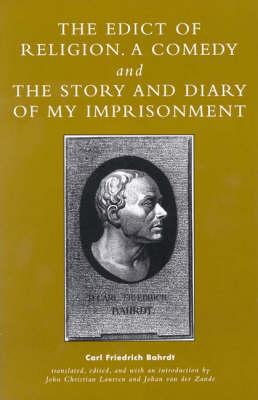Overview
Wider attention to Carl Friedrich Bahrdt should revise the standard picture of eighteenth-century Germany. German writers were often reported to be apolitical. Historians often claim that the Germans developed a more radical politics in response to the French Revolution. A commonly held stereotype depicts the Germans as having no sense of humor. Bahrdt's 1788 play The Edict of Religion, a ribald work of satire that attacks the tyranny and hypocrisy of the Prussian authorities, shatters these assumptions. The Edict of Religion is chiefly important in the history of ideas because it called for religious freedom, intellectual freedom, and freedom of the press before the French Revolution focused attention on human rights. Upon its publication, however, Bahrdt confronted the quasi-military discipline of the Prussian state that he denounced. He was tried and imprisoned—but could not be silenced. In The Story and Diary of My Imprisonment, also in this volume (and, like The Edict of Religion, here in English for the first time), Bahrdt holds the authorities up to ridicule and defends himself as an innocent victim.
Full Product Details
Author: Carl Friedrich Bahrdt ,
John Christian Laursen ,
Johan van der Zande
Publisher: Bloomsbury Publishing Plc
Imprint: Lexington Books
Dimensions:
Width: 14.90cm
, Height: 0.80cm
, Length: 22.70cm
Weight: 0.200kg
ISBN: 9780739100905
ISBN 10: 0739100904
Pages: 144
Publication Date: 19 March 2000
Audience:
College/higher education
,
Professional and scholarly
,
Undergraduate
,
Postgraduate, Research & Scholarly
Format: Paperback
Publisher's Status: Out of Print
Availability: Awaiting stock

Reviews
This fascinating little volume will be welcomed by students of the Enlightenment, will be a mandatory purchase for any serious research library, and would be a fine addition to any course interested in exploring one of the more interesting corners of the eighteenth century. The European Legacy - Toward New Paradigms Bahrdt's significance will continue to lie in the controversies generated by his radical theological ideas. This edition of his assertion of freedom of thought and expression as human rights should, however, draw attention to the wider significance of Bahrdt's opposition to authority. In future there will be no excuse for reading lists in English that simply contain Kant's more famous essay as the sole example of German Enlightenment thinking. History of Political Thought
This fascinating little volume will be welcomed by students of the Enlightenment, will be a mandatory purchase for any serious research library, and would be a fine addition to any course interested in exploring one of the more interesting corners of the eighteenth century. The European Legacy Bahrdt's significance will continue to lie in the controversies generated by his radical theological ideas. This edition of his assertion of freedom of thought and expression as human rights should, however, draw attention to the wider significance of Bahrdt's opposition to authority. In future there will be no excuse for reading lists in English that simply contain Kant's more famous essay as the sole example of German Enlightenment thinking. History Of Political Thought
This fascinating little volume will be welcomed by students of the Enlightenment, will be a mandatory purchase for any serious research library, and would be a fine addition to any course interested in exploring one of the more interesting corners of the eighteenth century. The European Legacy Bahrdt's significance will continue to lie in the controversies generated by his radical theological ideas. This edition of his assertion of freedom of thought and expression as human rights should, however, draw attention to the wider significance of Bahrdt's opposition to authority. In future there will be no excuse for reading lists in English that simply contain Kant's more famous essay as the sole example of German Enlightenment thinking. History of Political Thought
Author Information
John Christian Laursen is Professor of Political Science at the University of California, Riverside. Johan van der Zande is Visiting Scholar in History at the University of California, Berkeley.



